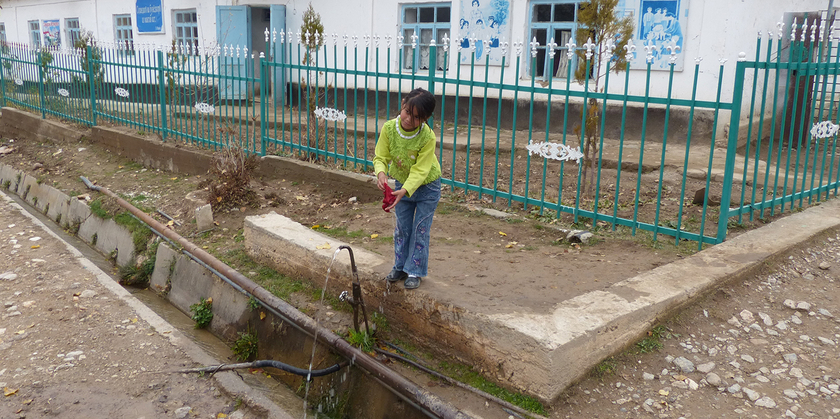Department Sanitation, Water and Solid Waste for Development
Institutional WASH

WASH in schools and health care facilities, which can be categorized as “institutional WASH” settings, is very problematic in low- and middle-income countries. Because many people are forced to share WASH facilities, schools and health care facilities can easily turn into vectors for the spread of disease, and many severe shortcomings have been observed in institutional WASH settings. However, they can also become platforms for behaviour change. The objective of the SESP Group is to support organisations and governments in the development of tools and guidelines to improve and monitor institutional WASH in their countries.
The Facility Evaluation Tool for WASH in Institutions (FACET)
Institutional water, sanitation and hygiene (WASH) in schools and health care facilities are key elements of sustainable development and significantly influence people’s health and well-being worldwide. The Facility Evaluation Tool for WASH in Institutions (FACET), jointly developed by Terre des hommes, Eawag and CartONG with support from the UNICEF/WHO Joint Monitoring Programme for Water Supply, Sanitation and Hygiene (JMP), is based on globally recognised indicators and is suitable across the continuum of humanitarian and development interventions. Here we offer a complete package for an entire monitoring project cycle from start to end.
A simple and adaptable analysis tool, FACET offers state-of-the-art online/offline mobile data collection on an open source platform. It is an easy-to-use gender sensitive monitoring tool for WASH delivery services in health care facilities (FACET WIH) and schools (FACET WINS) and contains core and expanded version available for performing short as well as detailed assessments. At the end of the survey, each WASH service level according to the JMP laddered approach is calculated by FACET and displayed on the mobile device ("basic service", "limited service", "no service").
Specific online and offline analysis tools allow off-the-shelf analysis of the collected data.
The FACET Analyzer is an easy-to-use excel-based offline tool that facilitates the analysis of FACET survey data according to the JMP approach. The FACET Analyser detects the type of survey (schools or health care) and updates headings, graphs and tables accordingly. The tool can also import and compare two different datasets. All graphs and tables can be copied and pasted into reports and presentations. following the instructions given within the tool or consult chapter 2.2 of the practitioner’s guide.
Alternatively, the PowerBI FACET Analyzer (PBI) allows online analysis of collected data according to the JMP approach. The different steps required to adapt the PBI templates for a given FACET survey are described in chapter 2.3 of the practitioner’s guide.
A separately available practitioner’s guide introduces the operating principles and basic features of the tool and offers a guideline how to adapt it to the local context. It is available in English and French and separately explains the content and logic of the indicators for schools and health care facilities. Additionally, it provides informative insights from field experience and offers additional material for enumerators and survey trainings as well as report templates.
Partner


WASH in schools in Tajikistan
The Oxfam in Tajikistan WASH Programme began the Tajikistan Water Supply and Sanitation Project (TajWSS) in 2009 with funding from the Swiss Development Cooperation (SDC). The project’s overall objective is to contribute to the creation of an enabling environment for the sustainable provision of safe drinking water and sanitation in rural Tajikistan. The components of the project are: (i) Policy work and TajWSS Network of Stakeholders, (ii) Capacity Building and Water Trust Funds, and (iii) Empowering consumers and communities. The project focuses on institutional sanitation and sanitation marketing.
The aim of the SESP group is to provide support for WASH in schools, as well as capacity-building. The objectives are to:
- Analyse the practices and results of school WASH projects implemented by national/regional governments and international organisations in Tajikistan and identify their advantages and drawbacks
- Assess the applicability and effectiveness of the various technical solutions
- Assess the quality of water in schools
- Assess the management models and mechanisms for operation and maintenance of the facilities
- Propose evidence-based recommendations
Partner

WASH in Health Care Facilities in Nepal, India and Uganda
In many low- and middle-income countries, WASH services in health care facilities are largely absent. The Sustainable Development Goals promote WASH service provision in institutional settings, such as health care facilities. Because data is scarce and assessment tools were inadequate in the past, the SESP group is collaborating with Terre des Hommes to develop monitoring and data collection tools. Special focus is being given to the needs of women, as they often comprise the largest group of providers of health care and users of health care facilities.
The research objectives are to:
- Develop new monitoring and assessment tools for WASH in health care facilities
- Analyse the special needs of various user groups, i.e. women, staff and attendants
- Assess the state of WASH in health care facilities in selected countries
Partner




